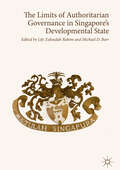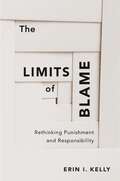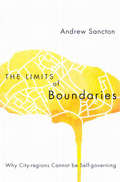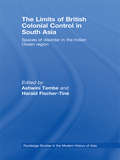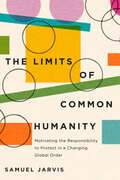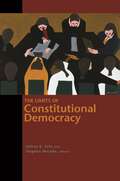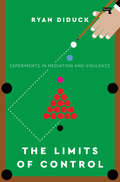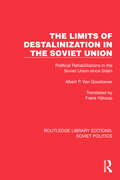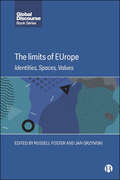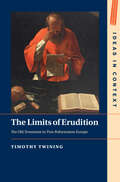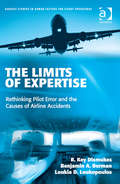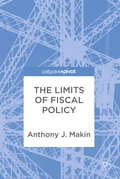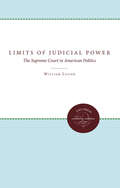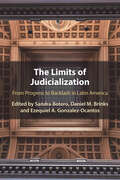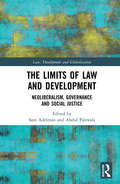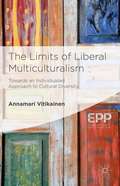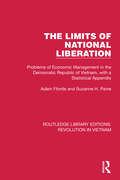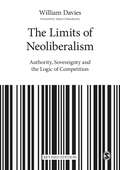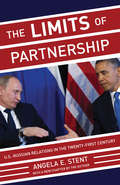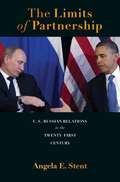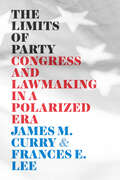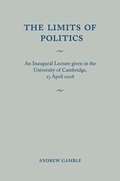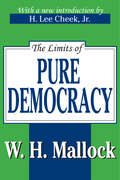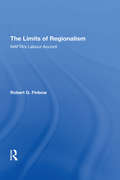- Table View
- List View
The Limits of Authoritarian Governance in Singapore's Developmental State
by Lily Zubaidah Rahim Michael D. BarrThis book delves into the limitations of Singapore’s authoritarian governance model. In doing so, the relevance of the Singapore governance model for other industrialising economies is systematically examined. Research in this book examines the challenges for an integrated governance model that has proven durable over four to five decades. The editors argue that established socio-political and economic formulae are now facing unprecedented challenges. Structural pressures associated with Singapore’s particular locus within globalised capitalism have fostered heightened social and material inequalities, compounded by the ruling party’s ideological resistance to substantive redistribution. As ‘growth with equity’ becomes more elusive, the rationale for power by a ruling party dominated by technocratic elite and state institutions crafted and controlled by the ruling party and its bureaucratic allies is open to more critical scrutiny.
The Limits of Blame: Rethinking Punishment and Responsibility
by Erin I. KellyFaith in the power and righteousness of retribution has taken over the American criminal justice system. Approaching punishment and responsibility from a philosophical perspective, Erin Kelly challenges the moralism behind harsh treatment of criminal offenders and calls into question our society’s commitment to mass incarceration.
The Limits of Boundaries
by Andrew SanctonAndrew Sancton combines his own broad knowledge of global changes with an outline and comparison of the viewpoints of prominent social scientists to argue that city regions in western liberal democracies will not and cannot be self-governing. Self-government requires a territory delineated by official boundaries, but the multiple boundaries of city-regions, unlike the clear and undisputed boundaries of provinces and states, continue to move outward due to the constant growth and expansion of urban populations and services.
The Limits of Boundaries: Why City-regions Cannot be Self-governing
by Andrew SanctonAndrew Sancton combines his own broad knowledge of global changes with an outline and comparison of the viewpoints of prominent social scientists to argue that city regions in western liberal democracies will not and cannot be self-governing. Self-government requires a territory delineated by official boundaries, but the multiple boundaries of city-regions, unlike the clear and undisputed boundaries of provinces and states, continue to move outward due to the constant growth and expansion of urban populations and services.
The Limits of British Colonial Control in South Asia: Spaces of Disorder in the Indian Ocean Region (Routledge Studies in the Modern History of Asia)
by Harald Fischer-Tiné Ashwini TambeThis book assesses British colonialism in South Asia in a transnational light, with the Indian Ocean region as its ambit, and with a focus on ‘subaltern’ groups and actors. It breaks new ground by combining new strands of research on colonial history. Thinking about colonialism in dynamic terms, the book focuses on the movement of people of the lower orders that imperial ventures generated. Challenging the assumed stability of colonial rule, the social spaces featured are those that threatened the racial, class and moral order instituted by British colonial states. By elaborating on the colonial state's strategies to control perceived 'disorder' and the modes of resistance and subversion that subaltern subjects used to challenge state control, a picture of British Empire as an ultimately precarious, shifting and unruly formation is presented, which is quite distinct from its self-projected image as an orderly entity. Thoroughly researched and innovative in its approach, this book will be a valuable resource for scholars of Asian, British imperial/colonial, transnational and international history.
The Limits of Common Humanity: Motivating the Responsibility to Protect in a Changing Global Order
by Samuel JarvisWhat motivates states to protect populations threatened by mass atrocities beyond their own borders? Most often, states and their representatives appeal to the principle of common humanity, acknowledging a conscience-shocking quality that demands a moral response. But though the idea of a common humanity is powerful, the question remains: to what extent is it effective in motivating action?The Limits of Common Humanity provides an ambitious interdisciplinary response to this question, theorizing the role of humanity as a motivational concept by building on insights from international relations, political philosophy, and international law. Through this analysis, Samuel Jarvis examines the influence the concept of humanity has had on the creation and mission of the Responsibility to Protect (R2P) commitment, while highlighting the challenges that have restricted its application in practice. By providing a new framework for thinking about how political, legal, and moral arguments interact during the process of collective decision-making, Jarvis explores the contradictory ways in which states approach the protection of human beings from mass atrocity crimes, both domestically and internationally.In the context of a rapidly changing global order, The Limits of Common Humanity is a timely reappraisal of the R2P concept and its future application, arguing for a more politically motivated response to human protection that moves beyond an appeal for morality.
The Limits of Constitutional Democracy (The University Center for Human Values Series #37)
by Stephen Macedo Jeffrey K. TulisConstitutional democracy is at once a flourishing idea filled with optimism and promise--and an enterprise fraught with limitations. Uncovering the reasons for this ambivalence, this book looks at the difficulties of constitutional democracy, and reexamines fundamental questions: What is constitutional democracy? When does it succeed or fail? Can constitutional democracies conduct war? Can they preserve their values and institutions while addressing new forms of global interdependence? The authors gathered here interrogate constitutional democracy's meaning in order to illuminate its future. The book examines key themes--the issues of constitutional failure; the problem of emergency power and whether constitutions should be suspended when emergencies arise; the dilemmas faced when constitutions provide and restrict executive power during wartime; and whether constitutions can adapt to such globalization challenges as immigration, religious resurgence, and nuclear arms proliferation. In addition to the editors, the contributors are Sotirios Barber, Joseph Bessette, Mark Brandon, Daniel Deudney, Christopher Eisgruber, James Fleming, William Harris II, Ran Hirschl, Gary Jacobsohn, Benjamin Kleinerman, Jan-Werner Müller, Kim Scheppele, Rogers Smith, Adrian Vermeule, and Mariah Zeisberg.
The Limits of Control: Experiments in Mediation and Virulence
by Ryan DiduckRyan Diduck turns his attention to control societies and their protocols in the wake of the global COVID-19 pandemic. What are the political implications of government measures to combat Coronavirus?The end of the world as we know it is no longer imaginary.Severe acute respiratory syndrome Coronavirus 2 (also known as SARS-CoV-2 or COVID-19) is a potent virus that is upturning nearly every aspect of life on earth. But the novel Coronavirus is more than just a virus. It is a marketplace and media event, too, broadcasting at speed, oscillating against the transmission of its mediations. Ultimately, COVID-19 is the pretext upon which nations around the world have enacted social controls of varying severity, strictly limiting the communication, movement, and daily activities of billions of people. This could be a moment of overwhelming consolidation of capital. Or it could further reveal the cracks in a system which has exacerbated the coronavirus pandemic. We are rapidly approaching the limits of control. In the tradition of William S. Burroughs, Naomi Klein, Mark Fisher, and other key theorists of discipline and jurisdiction, The Limits of Control offers a timely new analysis of control societies, and a sibylline roadmap for living together in a hypervirulent world. What we imagine from now on has never mattered more.
The Limits of Destalinization in the Soviet Union: Political Rehabilitations in the Soviet Union since Stalin (Routledge Library Editions: Soviet Politics)
by Albert P. van GoudoeverThe Limits of Destalinization in the Soviet Union (1986) examines the forms, aspects and significance of the phenomenon of rehabilitation in the Soviet Union between 1953 and 1980, when victims of Stalin’s terror were released from camps or posthumously rehabilitated. It describes the political manipulation of the selection of victims qualified for rehabilitation and reinstatement in the Communist Party, and reviews the formal and juridical procedures, as well as looking at the way in which the commemoration of the victims was handled in propaganda and historiography.
The Limits of EUrope: Identities, Spaces, Values (Global Discourse)
by Russell Foster, Jan GrzymskiIs the European Union (EU) in a state of crisis? Over recent years, a series of systemic and spontaneous challenges, including Brexit, the rise of Euroscepticism and the Eurozone and refugee crises, have manifested in landmark moments for European integration. First published as a special issue of the journal Global Discourse, this edited collection investigates whether these crises are isolated phenomena or symptoms of a deeper malaise across the EU. Experts from across disciplines analyse and rethink the forces which pull Europeans together, as well as those which push them apart.
The Limits of Erudition: The Old Testament in Post-Reformation Europe (Ideas in Context)
by Timothy TwiningThe history of early modern biblical scholarship has often been told as a teleological narrative in which a succession of radical thinkers dethroned the authority of the sacred word. This book tells a very different story. Drawing on a mass of archival sources, Timothy Twining reconstructs the religious, cultural, and institutional contexts in which the text of the Old Testament was considered and contested throughout post-Reformation Europe. In so doing, this book brings to light a vast array of figures from across the confessional spectrum who invested immense energy in studying the Bible. Their efforts, it shows, were not disinterested, but responded to pressing contemporary concerns. The Limits of Erudition employs a novel conceptual framework to resurrect a world where learning mattered to inquisitors and archbishops as much as to antiquaries, and in which the pursuit of erudition was too important to be left to scholars.
The Limits of Expertise: Rethinking Pilot Error and the Causes of Airline Accidents (Ashgate Studies in Human Factors for Flight Operations)
by R. Key Dismukes Benjamin A. Berman Loukia LoukopoulosWhy would highly skilled, well-trained pilots make errors that lead to accidents when they had safely completed many thousands of previous flights? The majority of all aviation accidents are attributed primarily to human error, but this is often misinterpreted as evidence of lack of skill, vigilance, or conscientiousness of the pilots. The Limits of Expertise is a fresh look at the causes of pilot error and aviation accidents, arguing that accidents can be understood only in the context of how the overall aviation system operates. The authors analyzed in great depth the 19 major U.S. airline accidents from 1991-2000 in which the National Transportation Safety Board (NTSB) found crew error to be a causal factor. Each accident is reviewed in a separate chapter that examines events and crew actions and explores the cognitive processes in play at each step. The approach is guided by extensive evidence from cognitive psychology that human skill and error are opposite sides of the same coin. The book examines the ways in which competing task demands, ambiguity and organizational pressures interact with cognitive processes to make all experts vulnerable to characteristic forms of error. The final chapter identifies themes cutting across the accidents, discusses the role of chance, criticizes simplistic concepts of causality of accidents, and suggests ways to reduce vulnerability to these catastrophes. The authors' complementary experience allowed a unique approach to the study: accident investigation with the NTSB, cognitive psychology research both in the lab and in the field, enormous first-hand experience of piloting, and application of aviation psychology in both civil and military operations. This combination allowed the authors to examine and explain the domain-specific aspects of aviation operations and to extend advances in basic research in cognition to complex issues of human performance in the real world. Although The Limits of Expertise is directed to aviation operations, the implications are clear for understanding the decision processes, skilled performance and errors of professionals in many domains, including medicine.
The Limits of Fiscal Policy
by Anthony J. MakinThis book presents alternative macroeconomic perspectives, primarily open economy, on the limitations of discretionary fiscal policy, with a focus on government spending. Following an overview on the post-crisis Keynesian revival and of the macro-foundations needed for subsequent analysis, different perspectives are expounded that highlight the failings of fiscal activism. These perspectives include extended loanable funds analysis, an expenditure-output related model incorporating money and exchange rates, and a dependent economy framework. The approaches are used to examine investment and net export crowding out effects and their implications for national income, and are then adapted to show the macroeconomic impact of different fiscal consolidation measures, revealing that the nature of fiscal repair is critical. A concluding chapter evaluates the nexus between budgetary policy and confidence, summarises the key failings of fiscal activism, and suggests fiscal policy goals. The book will appeal to university lecturers and researchers in macroeconomics and economists working in government and the private sector.
The Limits of Judicial Power: The Supreme Court in American Politics
by William LasserLasser examines in detail four periods during which the Court was widely charged with overstepping its constitutional power: the late 1850s, with the Dred Scott case and its aftermath; the Reconstruction era; the New Deal era; and the years of the Warren and Burger Courts after 1954. His thorough analysis of the most controversial decisions convincingly demonstrates that the Court has much more power to withstand political reprisal than is commonly assumed. Originally published in 1988.A UNC Press Enduring Edition -- UNC Press Enduring Editions use the latest in digital technology to make available again books from our distinguished backlist that were previously out of print. These editions are published unaltered from the original, and are presented in affordable paperback formats, bringing readers both historical and cultural value.
The Limits of Judicialization: From Progress to Backlash in Latin America
by Daniel M. Brinks Sandra Botero Gonzalez-Ocantos, Ezequiel A.Latin America was one of the earliest and most enthusiastic adopters of what has come to be known as the judicialization of politics - the use of law and legal institutions as tools of social contestation to curb the abuse of power in government, resolve policy disputes, and enforce and expand civil, political, and socio-economic rights. Almost forty years into this experiment, The Limits of Judicialization brings together a cross-disciplinary group of scholars to assess the role that law and courts play in Latin American politics. Featuring studies of hot-button topics including abortion, state violence, judicial corruption, and corruption prosecutions, this volume argues that the institutional and cultural changes that empowered courts, what the editors call the 'judicialization superstructure,' often fall short of the promise of greater accountability and rights protection. Illustrative and expansive, this volume offers a truly interdisciplinary analysis of the limits of judicialized politics.
The Limits of Law and Development: Neoliberalism, Governance and Social Justice (Law, Development and Globalization)
by Abdul Paliwala Sam AdelmanThe book examines the well-established field of ‘law and development’ and asks whether the concept of development and discourses on law and development have outlived their usefulness.The contributors ask whether instead of these amorphous and contested concepts we should focus upon social injustices such as patriarchy, impoverishment, human rights violations, the exploitation of indigenous peoples, and global heating? If we abandoned the idea of development, would we end up adopting another, equally problematic term to replace a concept which, for all its flaws, serves as a commonly understood shorthand? The contributors analyse the links between conventional academic approaches to law and development, neoliberal governance and activism through historical and contemporary case studies.The book will be of interest to students and scholars of development, international law, international economic law, governance and politics and international relations.
The Limits of Liberal Multiculturalism: Towards an Individuated Approach to Cultural Diversity (Palgrave Studies in Ethics and Public Policy)
by Annamari VitikainenThe Limits of Liberal Multiculturalism provides a timely analysis of some of the weaknesses, as well as the successes, of the liberal multicultural project. It also takes a step forward by developing a pluralist, individual-centred approach to allocating minority rights in practice.
The Limits of National Liberation: Problems of Economic Management in the Democratic Republic of Vietnam, with a Statistical Appendix (Routledge Library Editions: Revolution in Vietnam #3)
by Adam Fforde Suzanne H. PaineThis book, first published in 1987, examines the experience of the North Vietnamese economy during the struggle for national reunification and the Vietnam war. It chronicles the impact of war and Socialist Construction upon an extremely poor area left undeveloped by French colonial exploitation. The analysis focuses on the severe restraints that faced socio-economic development in North Vietnam, and the adverse effects of forced development based upon neo-Stalinist institutional models. Deep problems were encountered in attempting to implement Socialist Construction in the North, and wartime aid from fraternal Socialist countries masked the fundamental economic imbalances created by the development effort. After national reunification in 1975 the structural difficulties of the Northern economy and the shortcomings of its economic management system crushed the expectations of rapid peacetime development and led to the economic crisis of the late 1970s.
The Limits of Neoliberalism: Authority, Sovereignty and the Logic of Competition
by William DaviesBrilliant...explains how the rhetoric of competition has invaded almost every domain of our existence." —Evgeny Morozov, author of To Save Everything, Click Here" "In this fascinating book Davies inverts the conventional neoliberal practice of treating politics as if it were mere epiphenomenon of market theory, demonstrating that their version of economics is far better understood as the pursuit of politics by other means." —Professor Philip Mirowski, University of Notre Dame "A sparkling, original, and provocative analysis of neoliberalism. It offers a distinctive account of the diverse, sometimes contradictory, conventions and justifications that lend authority to the extension of the spirit of competitiveness to all spheres of social life…This book breaks new ground, offers new modes of critique, and points to post-neoliberal futures." —Professor Bob Jessop, University of Lancaster Since its intellectual inception in the 1930s and its political emergence in the 1970s, neo-liberalism has sought to disenchant politics by replacing it with economics. This agenda-setting text examines the efforts and failures of economic experts to make government and public life amenable to measurement, and to re-model society and state in terms of competition. In particular, it explores the practical use of economic techniques and conventions by policy-makers, politicians, regulators and judges and how these practices are being adapted to the perceived failings of the neoliberal model. By picking apart the defining contradiction that arises from the conflation of economics and politics, this book asks: to what extent can economics provide government legitimacy? Now with a new preface from the author and a foreword by Aditya Chakrabortty.
The Limits of Partnership
by Angela E. StentThe Limits of Partnership is a riveting narrative about U.S.-Russian relations from the Soviet collapse through the Ukraine crisis and the difficult challenges ahead. It reflects the unique perspective of an insider who is also recognized as a leading expert on this troubled relationship. American presidents have repeatedly attempted to forge a strong and productive partnership only to be held hostage to the deep mistrust born of the Cold War. For the United States, Russia remains a priority because of its nuclear weapons arsenal, its strategic location bordering Europe and Asia, and its ability to support--or thwart--American interests. Why has it been so difficult to move the relationship forward? What are the prospects for doing so in the future? Is the effort doomed to fail again and again? What are the risks of a new Cold War? Angela Stent served as an adviser on Russia under Bill Clinton and George W. Bush, and maintains dialogues with key policymakers in both countries. Here, she argues that the same contentious issues--terrorism, missile defense, Iran, nuclear proliferation, Afghanistan, the former Soviet space, the greater Middle East--have been in every president's inbox, Democrat and Republican alike, since the collapse of the USSR. Stent vividly describes how Clinton and Bush sought inroads with Russia and staked much on their personal ties to Boris Yeltsin and Vladimir Putin--only to leave office with relations at a low point--and how Barack Obama managed to restore ties only to see them undermined by a Putin regime resentful of American dominance and determined to restore Russia's great power status. The Limits of Partnership calls for a fundamental reassessment of the principles and practices that drive U.S.-Russian relations, and offers a path forward to meet the urgent challenges facing both countries. This edition includes a new chapter in which Stent provides her insights about dramatic recent developments in U.S.-Russian relations, particularly the annexation of Crimea, war in Ukraine, and the end of the Obama Reset.
The Limits of Partnership
by Angela StentThe Limits of Partnership offers a riveting narrative on U.S.-Russian relations since the Soviet collapse and on the challenges ahead. It reflects the unique perspective of an insider who is also recognized as a leading expert on this troubled relationship. American presidents have repeatedly attempted to forge a strong and productive partnership only to be held hostage to the deep mistrust born of the Cold War. For the United States, Russia remains a priority because of its nuclear weapons arsenal, its strategic location bordering Europe and Asia, and its ability to support--or thwart--American interests. Why has it been so difficult to move the relationship forward? What are the prospects for doing so in the future? Is the effort doomed to fail again and again? Angela Stent served as an adviser on Russia under Bill Clinton and George W. Bush, and maintains close ties with key policymakers in both countries. Here, she argues that the same contentious issues--terrorism, missile defense, Iran, nuclear proliferation, Afghanistan, the former Soviet space, the greater Middle East--have been in every president's inbox, Democrat and Republican alike, since the collapse of the USSR. Stent vividly describes how Clinton and Bush sought inroads with Russia and staked much on their personal ties to Boris Yeltsin and Vladimir Putin--only to leave office with relations at a low point--and how Barack Obama managed to restore ties only to see them undermined by a Putin regime resentful of American dominance and determined to restore Russia's great power status. The Limits of Partnership calls for a fundamental reassessment of the principles and practices that drive U.S.-Russian relations, and offers a path forward to meet the urgent challenges facing both countries.
The Limits of Party: Congress and Lawmaking in a Polarized Era (Chicago Studies in American Politics)
by Frances E. Lee James M. CurryTo many observers, Congress has become a deeply partisan institution where ideologically-distinct political parties do little more than engage in legislative trench warfare. A zero-sum, winner-take-all approach to congressional politics has replaced the bipartisan comity of past eras. If the parties cannot get everything they want in national policymaking, then they prefer gridlock and stalemate to compromise. Or, at least, that is the conventional wisdom. In The Limits of Party, James M. Curry and Frances E. Lee challenge this conventional wisdom. By constructing legislative histories of congressional majority parties’ attempts to enact their policy agendas in every congress since the 1980s and by drawing on interviews with Washington insiders, the authors analyze the successes and failures of congressional parties to enact their legislative agendas. ? Their conclusions will surprise many congressional observers: Even in our time of intense party polarization, bipartisanship remains the key to legislative success on Capitol Hill. Congressional majority parties today are neither more nor less successful at enacting their partisan agendas. They are not more likely to ram though partisan laws or become mired in stalemate. Rather, the parties continue to build bipartisan coalitions for their legislative priorities and typically compromise on their original visions for legislation in order to achieve legislative success.
The Limits of Politics: An Inaugural Lecture Given in the University of Cambridge, 23 April 2008
by Andrew GambleThis lecture explores the limits of politics in three senses: as a subject of study at Cambridge, as an academic discipline, and as a practical activity. Politics did not develop as an independent academic subject in Cambridge in the twentieth century, and only now is this situation being rectified with the creation of the new Department of Politics and International Studies. Politics as an academic discipline was once conceived as the master science. More recently it has become much more limited in its scope and its methods, but it still needs to preserve a tradition of political reasoning which focuses on problems rather than methodology, and is concerned with understanding the limits to politics. The limits of politics as a practical activity are explored through four modes of political reasoning: the sceptical, the idealist, the rationalist and the realist, as exemplified by the writings of Oakeshott, Keynes, Hayek, and Carr.
The Limits of Pure Democracy
by William Hurrell MallockThe 1910s was a decade in which theories of socialism, pacifism, and collectivism flowered. Publicists and playwrights from Sidney Webb to George Bernard Shaw expressed not just belief in "utopianism" but a vigorous assault on the existing political and economic order. Less well known is how a group of Tory thinkers laid the foundations of a conservative counter-attack expressed with equal literary and intellectual brilliance. Foremost among them was W. H. Mallock. In The Limits of Pure Democracy he argued that the pseudo-populist leaders of the political party system promise everything but deliver only the end of parties as such. For Mallock, what starts with populism ends in dictatorship. The Russian Revolution was simply the historical outcome of utopian socialist visions that were more dedicated to destroying the present system of things than bringing about a revitalized future. Mallock's book explains how the modern free market succeeds through competition in increasing output, broadening occupational opportunities, and multiplying the numbers of skilled professionals. In contrast, welfare schemes serve to deepen poverty by spreading wealth so evenly that incentives to work decline and personal savings are eliminated. These arguments have become commonplace today. But at the time they served as an incendiary reminder that class warfare works in both directions. Mallock was a remarkably talented writer who made the case against exaggerated expectations, a nascent welfare system, and mass political parties led by oligarchs. But he also offered a case for increasing a regard for work, advancing the cause of education as a method of entering the modern world, and for retaining a sense of religious codes that define the West. Mallock's search for an understanding of popular rule coincided with his appreciation and elucidation of the limitations of the emerging plebiscitarian spirit within democracy. The Limits of Pure Democracy will
The Limits of Regionalism: NAFTA's Labour Accord (The\international Political Economy Of New Regionalisms Ser.)
by Robert G. FinbowAssessing the effectiveness of the North American Agreement on Labour Cooperation (NAALC), this book examines the operation of the core institutions (the Secretariat and National Administrative Offices) over the past seven years. It discusses the main functions of these institutions in hearing public submissions on violations of labour laws and in conducting research and cooperative activities. Based on interview research, the analysis reviews the strengths and weaknesses of the accord to assess its contribution to a common labour relations regime in North America and its impact in creating new transnational communities of actors in government and civil society in the three countries. The NAALC is also compared with the social dimension of the European Union system, and a final assessment is made as to whether the NAALC institutions live up to the promises of their founders and whether these can be a model for labour relations in any future Free Trade Area of the Americas (FTAA) agreement.
